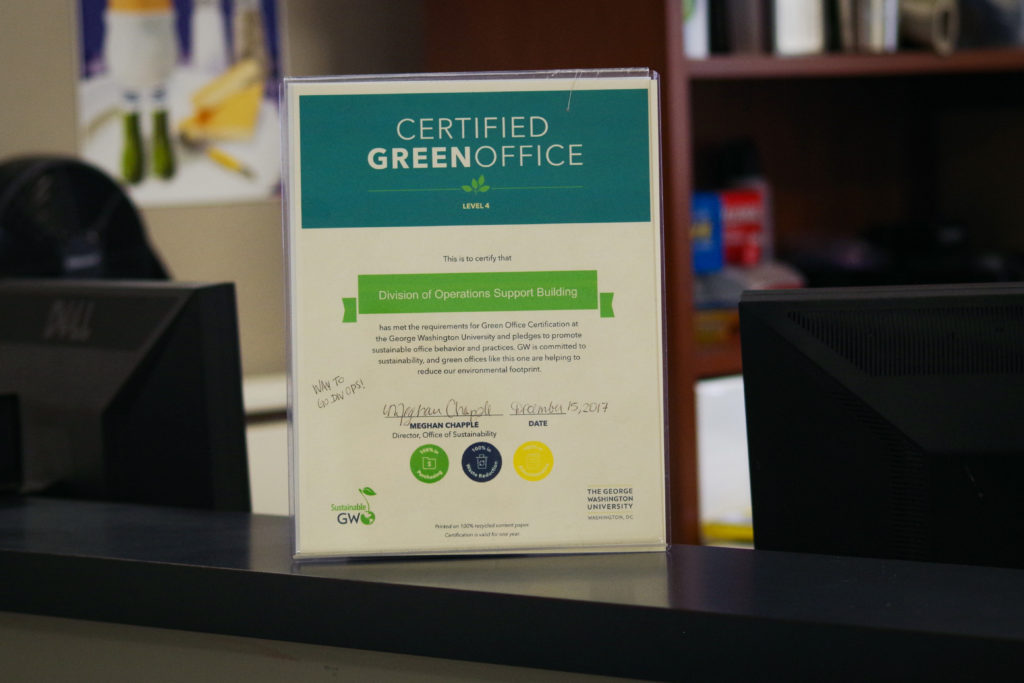Updated: Sept. 27, 2018 at 4:42 p.m.
More than 50 of GW’s offices are certified by the Office of Sustainability for conserving resources and reducing energy consumption.
The Green Office Certification program – an initiative that started in 2014 to incentivize GW offices and departments to implement sustainability practices, like saving paper and electricity – has certified 58 offices on campus, like the Nashman Center for Civic Engagement and Public Service. Officials said the program decreases the use of paper, food, water and energy while increasing awareness of sustainability issues among faculty and students.
University spokesman Tim Pierce said the Office of Sustainability uses a checklist to rate the level of sustainability of each office. He said the checklist includes scoring at least 20 accumulated points in categories including energy and electricity, transportation, printing and paper, purchasing, waste reduction and kitchen and indoor environment.
“The Green Office program not only contributes to a smaller footprint for GW but also helps to foster a culture of sustainability at GW,” Pierce said in an email. “The program allows individuals to reduce the footprint of their office and to connect with others across the university who are inspired by the same vision.”
Pierce said an office is also required to have a “green leader” in charge of maintaining and improving office compliance habits; managing proper signage on light switches, paper towel dispensers, printers, recycling and trash bins; and making the goals known to new office members. The leader is also required to participate in meetings and sustainability-related events at GW.
Pierce said the program’s incentives include reduced office waste and fewer overall expenses for office materials. He said the officials in the Office of Sustainability found they do not need to directly incentivize participation in the certification program because sustainability is an issue that faculty and staff “were already looking to improve.”
“Members of the GW community joined enthusiastically right at the program’s launch,” he said. “The program facilitates progress and offers recognition of offices that are choosing to make these strides and be a part of GW’s sustainable leadership.”
Amy Cohen – the executive director of the Nashman Center, which is certified through this program – said that going through the program helped members of her office learn about the most effective practices for being more sustainable and encouraged the office to make long-term changes, like using less or more sustainable resources.
“Our office is committed to good stewardship of the environment as well as to conserving GW’s resources,” Cohen said in an email. “The Green Office Program is really a win-win for the office, helping us keep costs down while supporting green policies.”
Cohen said the office worked on composting, purchasing 100-percent-recycled paper products, limiting the office’s print material and using natural light for most of the office spaces. She said the Nashman Center extended its sustainability efforts into days of service – like on Martin Luther King Day or Freshman Day of Service, where the office partners with organizations like the Food Recovery Network to eliminate food waste within programs.
Kim Fulmer – the administrative manager of the department of biological sciences, which was certified in 2016 – said administrators need to encourage their employees to take part in sustainable practices to create larger change on campus, where environmentally conscious decisions become everyday habits. She said even making small changes in an office, like going paperless, can influence the rest of the University to practice similar conservation efforts.
“Change will not happen without buy-in from leadership,” she said. “You can get rid of paper cups and supply employees with desk side recycling bins, but how do you get employees to use them?”
Jhovae Irving, a senior and the green office coordinator for the School of Engineering and Applied Sciences computing facility which was re-certified this summer, said the Office of Sustainability hosts events like gardening activities to help offices learn more about sustainable practices.
“The program encourages us to take more strides in making our office more sustainable, it also allows us to connect with other staff across the university who are committed to sustainability,” she said.
Lisa Tornatore, the assistant director for sustainability at Boston University, said BU uses a point system similar to GW, but instead of certifying offices, they certify staff members individually to change personal habits, which she said is more effective. Under this system, she said more than 1,700 individuals have become certified at Boston University.
Tornatore said BU’s sustainability office also incentivizes staff members by providing them with a sticker for their office nameplate that indicates a gold, silver or bronze status. She said this system creates a sense of competition among staff members to achieve a higher ranking.
“It is important to incentivize eco-friendly behavior because every action counts,” she said. “By incentivizing behaviors, we hope to create positive, sustainable habits that last.”
Steve Mital, the director of the office of sustainability at the University of Oregon, said that at his school, the sustainability office decides which offices get certified based on a point system. He said the categories for the scoreboard are similar to that of GW, and each office can receive a bronze, silver or gold level certification based on the number of points the office earns.
Mital said the University’s sustainability office should prioritize building relationships with administrative offices across campus to encourage widespread sustainability practices.
“Faculty and staff who get their offices certified, put solar on their rooftops and/or buy an electric car are more likely to integrate sustainability into their teaching and research,” he said.
Alaina Shuman contributed reporting.
Editor’s note: This post was updated to more accurately reflect a quote from Steve Mital.




